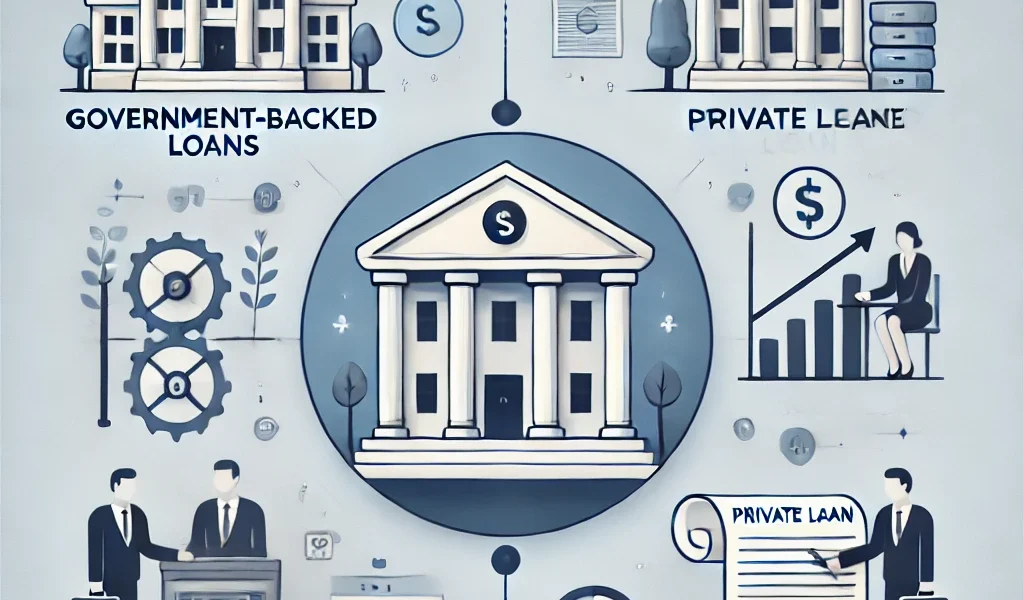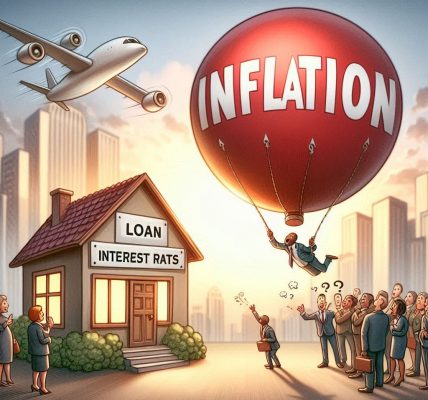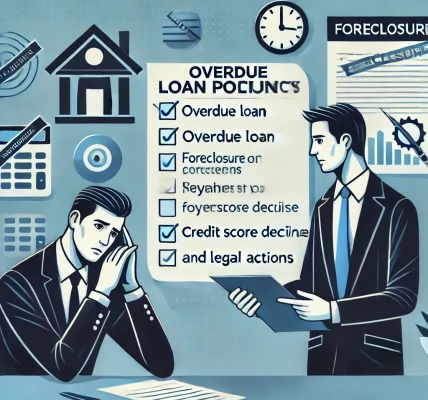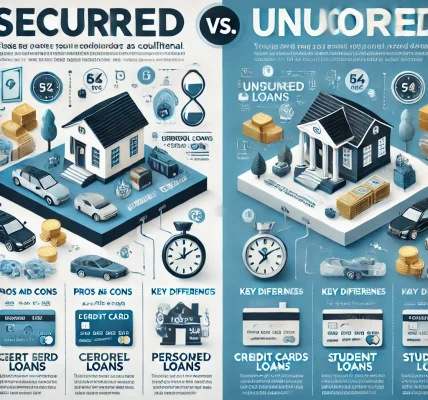Introduction
When it comes to borrowing money, individuals and businesses often face a choice between government-backed loans and private loans. Both options serve different purposes, offer unique benefits, and have specific eligibility criteria. Choosing the right loan depends on factors such as interest rates, repayment terms, flexibility, and accessibility.
In this detailed comparison, we will explore the differences between government-backed loans and private loans, their pros and cons, and which option may be better suited for different financial needs.
Disclaimer: This article is for informational purposes only and should not be considered financial or legal advice. Loan terms and policies vary by country, institution, and economic conditions. Always consult with a financial expert before making borrowing decisions.
What Are Government-Backed Loans?
Government-backed loans are loans that are supported or insured by a government agency. While private lenders (such as banks or credit unions) may distribute these loans, the government provides a guarantee, reducing the lender’s risk. As a result, these loans often come with lower interest rates and more favorable terms.
Common Types of Government-Backed Loans:
- Home Loans:
- FHA (Federal Housing Administration) Loans
- VA (Veterans Affairs) Loans
- USDA (United States Department of Agriculture) Loans
- Student Loans:
- Federal Direct Subsidized and Unsubsidized Loans
- Parent PLUS Loans
- Perkins Loans (discontinued but still in repayment)
- Small Business Loans:
- SBA (Small Business Administration) Loans
- Microloans backed by government agencies
- Personal and Emergency Loans:
- Disaster relief loans (e.g., FEMA loans)
- Government relief programs (e.g., COVID-19 stimulus loans)
Advantages of Government-Backed Loans
✅ Lower Interest Rates: The government guarantee reduces the risk for lenders, allowing for more competitive rates. ✅ Easier Qualification Requirements: Borrowers with lower credit scores or limited credit history may qualify. ✅ Flexible Repayment Terms: Longer repayment periods, income-based repayment plans, and deferment options. ✅ Additional Benefits: Some government-backed loans offer forgiveness programs or lower down payment requirements.
Disadvantages of Government-Backed Loans
❌ Strict Eligibility Criteria: Many government-backed loans have specific eligibility requirements, such as income limits, location-based restrictions, or employment status. ❌ Longer Processing Time: Due to additional paperwork and government verification, approval can take longer. ❌ Usage Restrictions: Some loans can only be used for specific purposes (e.g., FHA loans must be used for primary residences, not investment properties).
What Are Private Loans?
Private loans are offered by banks, credit unions, online lenders, or financial institutions without government backing. Since these loans are not insured by the government, lenders take on more risk and set their own terms based on a borrower’s creditworthiness.
Common Types of Private Loans:
- Personal Loans: Offered by private lenders for various purposes, such as home improvements, medical expenses, or consolidating debt.
- Private Student Loans: Provided by banks or credit unions as an alternative to federal student loans.
- Mortgages: Conventional home loans without government backing.
- Business Loans: Lines of credit or term loans for businesses without SBA guarantees.
Advantages of Private Loans
✅ Faster Approval Process: Many private lenders offer same-day or next-day approvals. ✅ More Loan Options: Borrowers can choose from a variety of loan products with different repayment structures. ✅ No Usage Restrictions: Unlike government-backed loans, private loans can often be used for any legal purpose. ✅ Higher Loan Amounts Available: Some private lenders offer larger loan amounts compared to government-backed loans.
Disadvantages of Private Loans
❌ Higher Interest Rates: Since private lenders take on more risk, interest rates are often higher. ❌ Strict Credit Requirements: Borrowers with lower credit scores may face difficulty qualifying or may receive high-interest rates. ❌ Limited Repayment Flexibility: Private loans often lack options like income-based repayment or loan forgiveness programs.
Comparison Table: Government-Backed Loans vs. Private Loans
| Feature | Government-Backed Loans | Private Loans |
|---|---|---|
| Interest Rates | Lower | Higher |
| Approval Process | Longer, more paperwork | Faster, fewer requirements |
| Credit Score Requirements | Lower, more forgiving | Higher, stricter approval process |
| Usage Restrictions | Often restricted to specific purposes | No restrictions |
| Repayment Flexibility | More flexible repayment terms | Limited flexibility |
| Loan Amounts | Usually capped | Can be higher depending on lender |
Which One Is Better?
Government-Backed Loans Are Better If:
✅ You have a lower credit score and need better approval chances. ✅ You want lower interest rates and affordable repayment terms. ✅ You need access to forgiveness programs (e.g., student loan forgiveness, SBA debt relief). ✅ You are purchasing a home with a lower down payment.
Private Loans Are Better If:
✅ You need quick access to funds and a faster approval process. ✅ You have a high credit score and can qualify for competitive rates. ✅ You want larger loan amounts without government-imposed limits. ✅ You need a loan with no usage restrictions.
Final Thoughts
Both government-backed loans and private loans have their own advantages and drawbacks. The right choice depends on your financial situation, credit score, and loan purpose.
- If you are looking for lower interest rates, better repayment terms, and financial protections, a government-backed loan may be the best choice.
- If you need faster approval, higher loan amounts, and more flexibility, a private loan could be the right option.
Before choosing any loan, always compare different lenders, review terms carefully, and consult with a financial expert to ensure you make the best decision for your needs.
Disclaimer: This article is for educational purposes only and does not constitute financial advice. Loan terms and eligibility criteria vary by lender and country. Always review the terms and conditions before making a borrowing decision.




